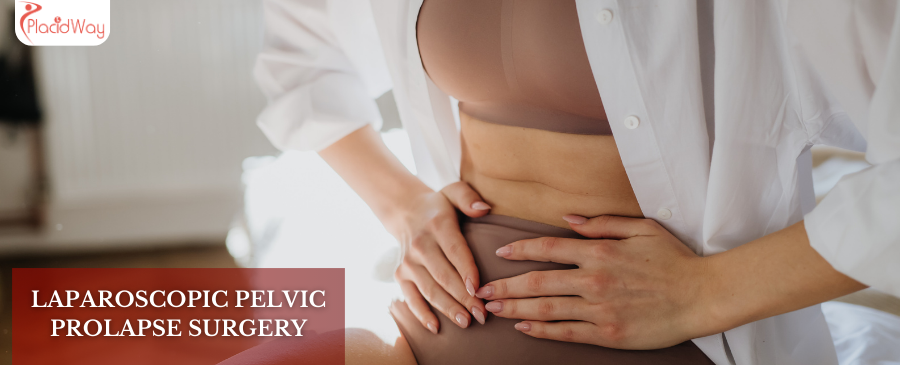
Reclaim Your Comfort: Understanding Laparoscopic Pelvic Prolapse Surgery and Global Options
Living with pelvic organ prolapse can significantly impact your daily life, causing discomfort, affecting intimacy, and limiting your activities. You might feel a persistent pressure, notice a bulge, or experience urinary and bowel issues that make every day a challenge. If conservative treatments haven't provided the relief you need, Laparoscopic Pelvic Prolapse Surgery offers a modern, effective solution to restore your comfort and confidence.
This advanced, minimally invasive procedure uses small incisions, specialized instruments, and a camera to repair and reinforce weakened pelvic floor tissues. Unlike traditional open surgery, laparoscopic techniques often lead to less pain, reduced scarring, a shorter hospital stay, and a quicker return to your normal routine. Many patients globally are now choosing this innovative approach, often exploring medical tourism to access world-class care at more accessible costs, without compromising on quality or expertise.
Understanding the condition, the surgical process, and your options can be the first step towards a life free from prolapse symptoms. Whether you're dealing with a dropped bladder (cystocele), uterus (uterine prolapse), or rectum (rectocele), laparoscopic surgery aims to reposition and secure these organs, providing lasting relief. Join us as we explore what this life-changing procedure entails, who it's for, what to expect, and why international healthcare might be your best path to recovery.
What are the common symptoms of pelvic organ prolapse?
Pelvic organ prolapse occurs when the muscles and tissues supporting the pelvic organs (uterus, bladder, rectum) weaken, causing one or more of these organs to descend or bulge into the vagina. The symptoms can range from mild to severe and often worsen throughout the day or after prolonged standing. If you've been searching for "what does pelvic prolapse feel like" or "signs of a dropped bladder," you might recognize these common indicators:
- Vaginal pressure or fullness: A sensation of heaviness or "something falling out" in the pelvic area.
- Visible bulge: In more advanced cases, a tissue bulge may be felt or seen at the vaginal opening.
- Urinary problems: Difficulty starting urination, frequent urination, feeling of incomplete emptying, or stress incontinence (leaking urine when coughing, sneezing, or laughing).
- Bowel difficulties: Constipation, straining during bowel movements, or needing to press on the vagina to empty the rectum (digitation).
- Sexual discomfort: Pain during intercourse or a feeling of looseness in the vagina.
- Lower back pain: Aching in the lower back that improves when lying down.
These symptoms can be distressing and significantly impact quality of life, prompting many to seek solutions for "pelvic floor problems" or "vaginal prolapse discomfort."
What causes pelvic organ prolapse and who is at risk?
The pelvic floor is a complex network of muscles, ligaments, and connective tissues that act like a hammock, supporting your pelvic organs. When this support system weakens, prolapse can occur. Key factors contributing to this weakening include:
- Childbirth: Vaginal delivery, especially with larger babies, forceps delivery, or prolonged pushing, is a leading cause.
- Aging and Menopause: As women age, estrogen levels decline, which can lead to thinning and weakening of pelvic tissues.
- Genetics: Some women are naturally predisposed to weaker connective tissues.
- Increased abdominal pressure: Chronic coughing (e.g., from smoking or asthma), heavy lifting, obesity, and prolonged straining during bowel movements can put excessive pressure on the pelvic floor over time.
- Prior pelvic surgery: Hysterectomy, while not a direct cause, can sometimes increase the risk of vaginal vault prolapse later on.
Understanding these risk factors, often searched as "why do women get prolapse" or "risk factors for uterine prolapse," is crucial for prevention and early intervention.
What types of laparoscopic procedures treat pelvic prolapse?
Laparoscopic surgery offers several sophisticated ways to repair different types of pelvic prolapse. These procedures aim to restore the organs to their natural position and provide strong, lasting support:
- Laparoscopic Sacrocolpopexy: Considered the gold standard for treating apical prolapse (vaginal vault or uterine prolapse), this procedure involves using a synthetic mesh to lift and secure the vagina (or uterus) to the sacrum (tailbone), providing robust and long-term support. Patients often search for "mesh surgery for prolapse" or "sacrocolpopexy procedure."
- Laparoscopic Colporrhaphy (Anterior/Posterior): This involves repairing the bladder (cystocele) or rectal (rectocele) prolapse. The surgeon reinforces the vaginal wall directly behind the bladder or in front of the rectum, using sutures and sometimes mesh, to push the organs back into place. Often referred to as "bladder lift surgery" or "rectocele repair."
- Laparoscopic Hysterectomy with Uterine Suspension: If uterine prolapse is significant and a woman no longer wishes to preserve her uterus, a laparoscopic hysterectomy may be performed, often combined with a procedure to support the remaining vaginal vault to prevent future prolapse.
- Laparoscopic Enterocele Repair: This procedure addresses small bowel prolapse into the upper vagina, often by reinforcing the tissue between the vagina and rectum.
These "minimally invasive prolapse repair" techniques leverage small incisions, leading to a faster and less painful recovery for many patients.
Am I eligible for laparoscopic pelvic prolapse surgery?
Cheap Gyn Surgical Procedures Packages
Laparoscopic Pelvic Prolapse Surgery: Restoring Pelvic Health Minimally Invasively
About Sub Treatment
- Treatment: Gynecology Treatment
- Modified Date: 2024-12-09
- Overview: Explore minimally invasive laparoscopic pelvic prolapse surgery. Understand symptoms, recovery, and find affordable, high-quality treatment options through medical tourism.










Share this listing